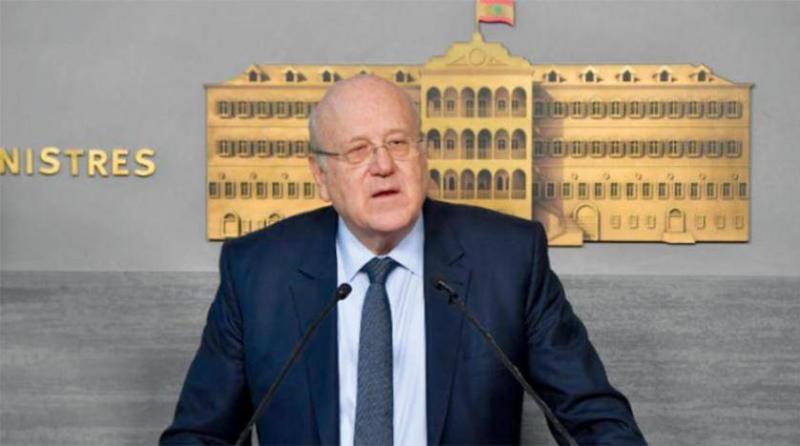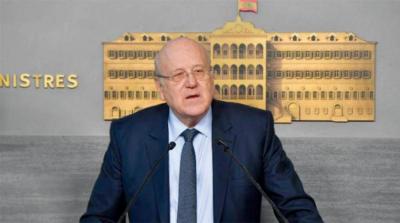Lebanese-Arab relations, specifically with the Gulf, are entering a phase of testing intentions. Prime Minister Najib Mikati hopes this will lead to a resolution that closes the chapter on the rift that has affected these relations, ultimately activating cooperation to help reduce the suffering of Lebanese people. This was the focus of his call with Kuwaiti Foreign Minister Sheikh Ahmad Nasser Al-Mohammad Al-Sabah, reflected by the Kuwaiti Ambassador to Lebanon, Abdel Aal Al-Qanaei, who stated to "Asharq Al-Awsat" that the communication was positive, and we hope for quick results.
Mikati confirmed to "Asharq Al-Awsat" that the Lebanese government is open to the Arab international Gulf paper brought to Beirut by the Kuwaiti Foreign Minister, engaging with it positively and expressing satisfaction with Saudi Arabia's initiative to establish a financial fund dedicated to providing support to unofficial institutions in health, education, and humanitarian aid that pay attention to the needs of Lebanese citizens in this regard, given the state's inability to meet these needs due to the deterioration of the financial and economic situation.
He mentioned that the establishment of the Saudi-French fund was decided upon in a meeting between Saudi Foreign Minister Prince Faisal bin Farhan and his French counterpart Jean-Yves Le Drian. Mikati confirmed that Saudi Arabia donated $36 million through the King Salman Relief Center, indicating the beginning of the disbursement of aid to unofficial humanitarian institutions. He revealed that the green light for the disbursement of aid was given in a recent bilateral meeting in Paris involving Saudi Royal Diwan advisor Nizar Al-Aloula, Saudi Ambassador to Lebanon Walid Bukhari, and French President advisor Patrick Durel.
Mikati stated that he is in contact with Durel and noted that the King Salman Relief Center is currently preparing field studies to assess the needs of humanitarian institutions in preparation for assisting them. He expected that Saudi Arabia would increase its contribution to the fund specifically established for Lebanon.
In response to a question, Mikati asserted that the government is fully committed to maintaining the best relations with Gulf Arab states, particularly Saudi Arabia, to mend the rift affecting these relations and to activate and enhance cooperation based on Lebanon's commitment to all Arab and international decisions and serious measures to maintain Lebanon's stability and fortify it, preventing anyone from attempting to disrupt civil peace.
He added, "The Lebanese government fully understands that Lebanon cannot be a starting point for any political, military, security, or media activities that could threaten its stability and undermine its historical relations with the Gulf states, foremost among them Saudi Arabia."
Mikati emphasized the government's commitment to taking all measures to prevent the trafficking of prohibited substances, especially drugs, to Gulf countries, which are keen to ensure the safety of their citizens and residents. He expressed the government's readiness, through its concerned security institutions combatting drug trafficking, especially Captagon pills. He stressed the need for security coordination in this area for information exchange and to close all air, sea, and land crossings to traffickers, in addition to destroying the factories responsible for producing Captagon.
He confirmed that the government is serious in preventing the use of financial and banking channels for money laundering, especially those used to fund terrorist activities that destabilize the region and threaten the security of Gulf states. He stated that his communications with Kuwait remain ongoing and that he closely follows French efforts aimed at rectifying Lebanese-Gulf relations.
Mikati expressed satisfaction with the role Paris is playing with Saudi Arabia to purify Lebanese-Gulf relations from all that has tainted them, particularly as Gulf countries have been and will continue to be supportive of Lebanon's stability and providing humanitarian aid to the Lebanese people. He stated there is no interest for Lebanon to become a platform for sending messages to Arab brothers and interfering in their internal affairs because they are not inclined to live in isolation from their Arab surroundings.
Thus, Mikati emphasizes the significance of Lebanon entering a phase of testing intentions to lay the groundwork for reviving its relations with Gulf countries, hoping to swiftly overcome this phase to move towards political recovery. Meanwhile, the King Salman Relief Center is close to establishing a mechanism to be run by a specialized team to begin disbursing aid to unofficial humanitarian institutions working in relief, health, and education as a contribution to financing primary humanitarian projects to assist the Lebanese people.
In this context, a leading source in the "Progressive Socialist Party" expressed satisfaction with the current atmosphere surrounding Lebanese-Gulf relations, stating to "Asharq Al-Awsat" that continuous communication is essential to reassure Gulf Arab brothers, especially Saudi Arabia, that the government is determined to rectify relations by taking strict measures to address the reasons behind their deterioration and not to be lenient with those attempting to target them by involving Lebanon in a power struggle through its use as a platform to threaten the security of Gulf states and the safety of their citizens.
The source pointed out that Lebanon entering a phase of testing intentions requires translating commitments into tangible actions, which falls on the government and its president, who shows full readiness to overcome the difficult phase that relations have passed through due to turning the country into a "host" for undermining its Arab brothers. The source expects to transition these relations into a phase of improvement, although it requires the government to continue undertaking necessary steps, starting with confronting projects aimed at integrating Lebanon into the axis of resistance sponsored by Hezbollah on behalf of Iran.
The leadership of the party, following President Walid Jumblatt's directives, is actively supporting the Prime Minister's efforts to improve Lebanese-Gulf relations. They are in contact with the Saudi and Kuwaiti ambassadors to pave the way for restoring and activating relations, especially since the Gulf states do not have specific projects for Lebanon like others do, as they have been and continue to support efforts to bring Lebanon out of its crises and maintain its stability without exposing its civil peace to setbacks that could lead to chaos, acknowledging that the political key to transitioning relations to improvement lies with the government.




